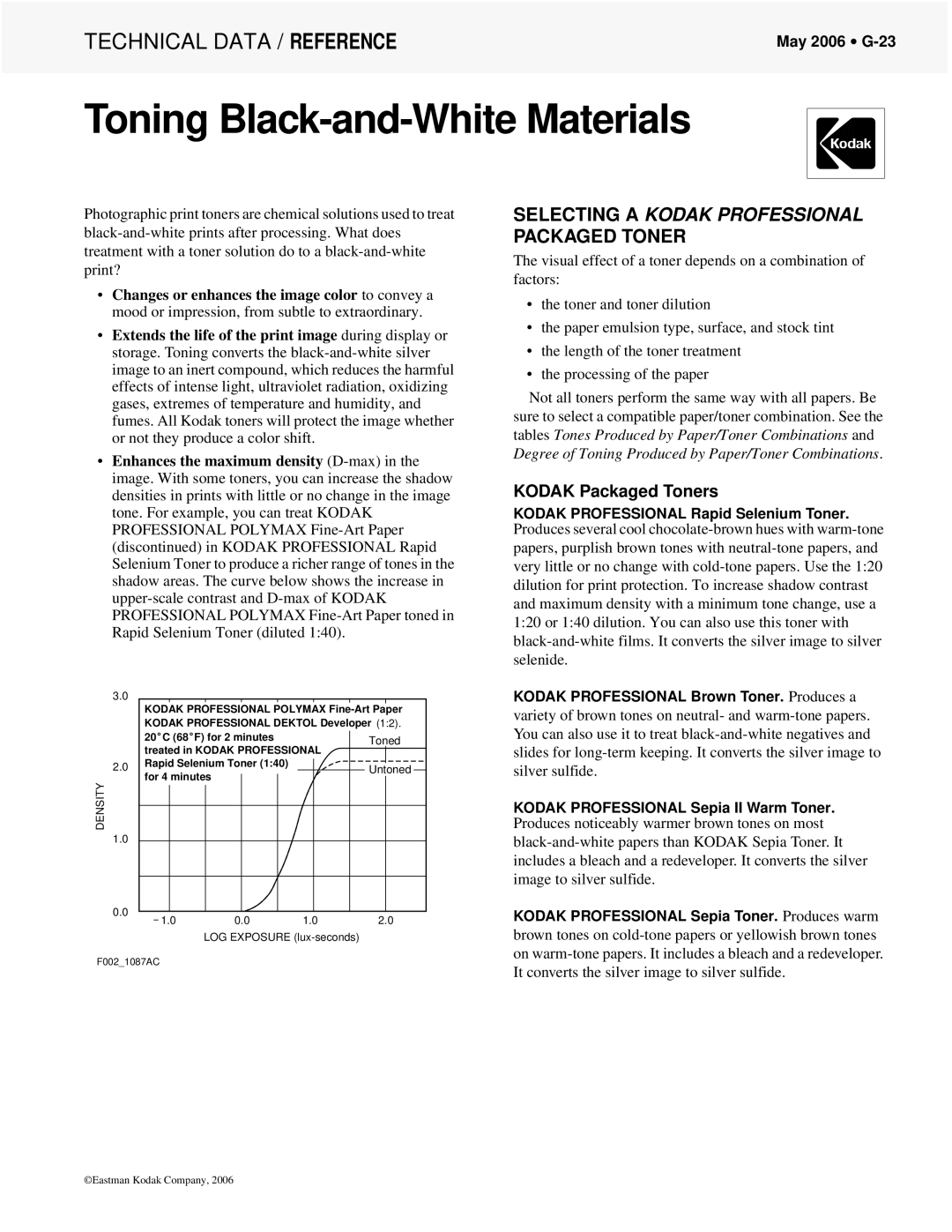Photographic print toners are chemical solutions used to treat black-and-white prints after processing. What does treatment with a toner solution do to a black-and-white print?
•Changes or enhances the image color to convey a mood or impression, from subtle to extraordinary.
•Extends the life of the print image during display or storage. Toning converts the black-and-white silver image to an inert compound, which reduces the harmful effects of intense light, ultraviolet radiation, oxidizing gases, extremes of temperature and humidity, and fumes. All Kodak toners will protect the image whether or not they produce a color shift.
•Enhances the maximum density (D-max) in the image. With some toners, you can increase the shadow densities in prints with little or no change in the image tone. For example, you can treat KODAK PROFESSIONAL POLYMAX Fine-Art Paper (discontinued) in KODAK PROFESSIONAL Rapid Selenium Toner to produce a richer range of tones in the shadow areas. The curve below shows the increase in upper-scale contrast and D-max of KODAK PROFESSIONAL POLYMAX Fine-Art Paper toned in Rapid Selenium Toner (diluted 1:40).
3.0
KODAK PROFESSIONAL POLYMAX Fine-Art Paper KODAK PROFESSIONAL DEKTOL Developer (1:2).
20 C (68 F) for 2 minutesToned treated in KODAK PROFESSIONAL
| 2.0 | Rapid Selenium Toner (1:40) | Untoned |
| for 4 minutes |
| | |
DENSITY
1.0
0.0
LOG EXPOSURE (lux-seconds)
F002_1087AC
SELECTING A KODAK PROFESSIONAL PACKAGED TONER
The visual effect of a toner depends on a combination of factors:
•the toner and toner dilution
•the paper emulsion type, surface, and stock tint
•the length of the toner treatment
•the processing of the paper
Not all toners perform the same way with all papers. Be sure to select a compatible paper/toner combination. See the tables Tones Produced by Paper/Toner Combinations and Degree of Toning Produced by Paper/Toner Combinations.
KODAK Packaged Toners
KODAK PROFESSIONAL Rapid Selenium Toner.
Produces several cool chocolate-brown hues with warm-tone papers, purplish brown tones with neutral-tone papers, and very little or no change with cold-tone papers. Use the 1:20 dilution for print protection. To increase shadow contrast and maximum density with a minimum tone change, use a 1:20 or 1:40 dilution. You can also use this toner with black-and-white films. It converts the silver image to silver selenide.
KODAK PROFESSIONAL Brown Toner. Produces a variety of brown tones on neutral- and warm-tone papers. You can also use it to treat black-and-white negatives and slides for long-term keeping. It converts the silver image to silver sulfide.
KODAK PROFESSIONAL Sepia II Warm Toner.
Produces noticeably warmer brown tones on most black-and-white papers than KODAK Sepia Toner. It includes a bleach and a redeveloper. It converts the silver image to silver sulfide.
KODAK PROFESSIONAL Sepia Toner. Produces warm brown tones on cold-tone papers or yellowish brown tones on warm-tone papers. It includes a bleach and a redeveloper. It converts the silver image to silver sulfide.

